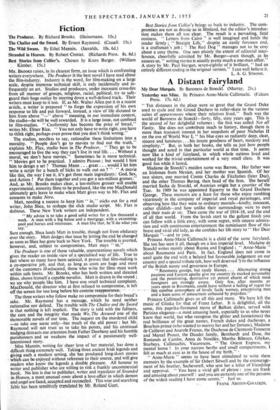A Distant Fairyland
My Dear Marquis. By Baroness de Stoeckl. (Murray. 21s.)
• 7.
"THE distances in the place were so great that the Grand Duke used to cycle and the Grand Duchess to roller-skate to the various suites of appartements where their relatives lived." Such was the world of Baroness de Stoeckl— forty, fifty, sixty years ago. This is the second of her delightful volumes • the first was called Not all Vanity. She does not contribute much to history, though there is more than transient interest in her snapshots of poor Nicholas II on the eve of World War I, " his blue eyes so radiantly deep, clear, sincere and luminous ... his innate goodness of heart, modesty and simplicity." But, in both her books, she tells us just how people thought and acted in that particular world at that time. It seems now like a kind of fairyland, in which whole nations lived and worked for the trivial entertainment of a very small class. It was good fun while it lasted.
Madame de Stoeckl's maiden name was Barron. Her father was an Irishman from Mexico, and her mother was Spanish. Of her two sisters, one married Comte Charles de FitzJames (later Due), and the other Thomas Baring, then head of the firm. She herself married Sasha de Stoeckl, of Austrian origin but a courtier of the Tsar. In 1909 he was appointed Equerry to the Grand Duchess George. These memoirs are a feast for those who enjoy rambling vicariously in the company of imperial and royal personages, and observing how like they were to ordinary mortals—kindly, innocent, rather childish—and how unlike their surroundings were to ours and their train de vie. Then came the war of 1914-18, and the end of all that world. From the lavish start to the gallant finish you can follow with a little envy, with some regret, with sincere admira- tion and with continuous entertainment the reminiscent flow of this brave and vivid old lady, as she confides her life story to" Her Dear Marquis "—and to you.
Princess Anne-Marie Callimachi is a child of the same fairyland. She too has seen it all, though on a less imperial level. Madame de Stoeckl writes mainly about Russia and England ; " Anne-Marie " about Roumania and Paris. In fact, England does not come in until quite the end with a belated but favourable judgement on our country and a special tribute (oh, how well deserved !) to the influence of the British nanny and governess in Europe.
"Roumania gossips, but rarely blames.... Alternating strong passions and Eastern apathy give my country its marked personality and the penetrating, destructive yet potent charm of which most foreigners are strongly aware. Only few, after months or years spent in Roumania, could leave without a feeling of regret for this -carefree atmosphere of lovely facile women, enterprising men and a keen sense of amusement unbound by prejudice.
Princess Callimachi gives us all this and more. We have left the music of Glinka for that of Franz Lehar. It is delightful, all the same, this paprika-flavoured menu of Balkan dishes, served with Parisian elegance—a most amusing book, especially to us who never knew that world, but who recognise the glitter and (sometimes) the real brilliance of the great names, French dukes and duchesses, a Bourbon prince (who wanted to marrry her and her fortune), Madame de Caillavet and Anatole France, the Duchesse de Clermont-Tonnerre and Marcel Proust, the Daudet family, Bernhardt and Duse, the Rostands at Cambo, Anna de Noailles, Martha Bibesco, Ghykas, Sturbeys, Callimachis, Vacarescos. "The Orient Express, my mental home ! In your narrow berths and small compartments, I felt as much at ease as in the house of my birth." •
" Anne-Marie " seems to have been stimulated to write these memoirs by the example of Sir Osbert Sitwell and by the encourage- ment of his brother, Sacheverell, who sent her a letter of friendship and approval. " You have a vivid gift of phrase : you are frank and amusing about yourself : and you are certainly, one of the persons of the widest reading I have come across." Just so.
FRANK ASHTON-GWATKIN.






























 Previous page
Previous page